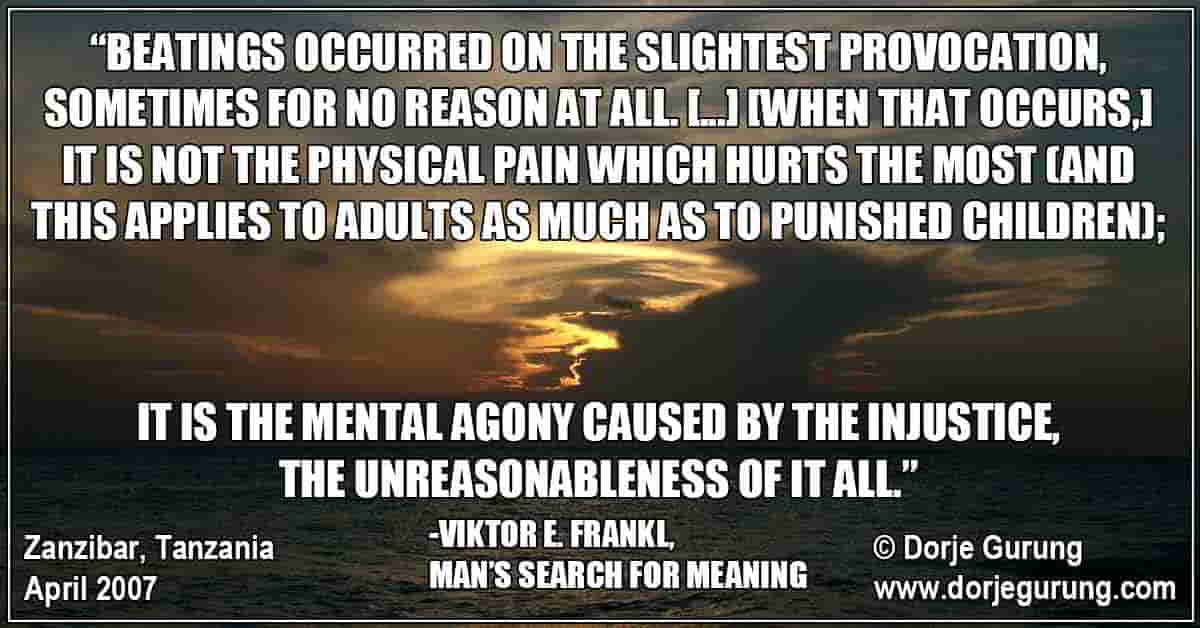To reiterate what Viktor Frankl in Man’s Search for Meaning says:
“Beating occurred on the slightest provocation, sometimes for no reason at all. […] [When that occurs,] it is not the physical pain which hurts the most (and this applies to adults as much as to punished children); it is the mental agony caused by the injustice, the unreasonableness of it all.” (pp. 36)
I know about the mental agony inflicted by the unreasonableness of injustice from my traumatic experience in Qatar seven years ago. Having experienced it myself, I also know about the long-term effect of physical violence inflicted on children both at homes and schools.
So, naturally, something I have been stressing in my workshops and presentations to parents and teachers in Nepal is to RESPECT children by LISTENING to them FIRST, and then engaging with them. That’s essentially how I have been raising my little nephew all these years — which is his entire eight years of life so far! That, not surprisingly, eliminates a lot of the issues adults face raising children. It certainly has with my little nephew; he doesn’t know anything about screaming, shouting, and throwing temper tantrums, for example.
Raise them by showing respect to them even as babies and toddlers, they’ll grow up learning about respect and respecting you. When she is old enough, she’ll understand that what you did (listening to them when she was a child) was showing them respect and them listening to you, in turn, was them showing you respect. Respect is better instilled by showing than by demanding it!
If instead, when as an adult you REACT to a child instead of INTERACTING with her, very often you make the mistake of punishing them for reasons you alone know, or understand. She might find your reasons unreasonable but you won’t come to know that since you don’t interact with her, since you don’t give her the opportunity to express herself.
Beating a child, in my opinion, is one of the worst things you can do since she is NOT able to connect the physical pain inflicted to that which she is supposed to have done or not done. The mental agony there — which hurts her the most just as Frankl says — and the memory of the pain stay with her rather than the lesson behind it. What she’ll learn is to avoid the pain — the physical punishment.
That sense of “unfairness” that sense of “injustice” will shape not only how she relates to you, the adult — and possibly with others as a child — but also how she engages with you throughout her life, unless something changes about the relationship. Sure, as a child, she might not be able to articulate it but, trust me, she will have a feeling and a sense for the “unfairness” of the beatings or other punishments you mete out to her. Worse, she’ll carry that imprint, that trauma with her, especially if you don’t explain it to her.
Do that enough times for long enough, the child, for example, will lose respect for you. That’s something I experienced and learned — both in school as well as at home — as a child growing up in Nepal. I am pretty sure that’s how it is with a significant percentage of Nepali children growing up in the country even now given how prevalent violence against children is, both in schools and homes.
If you raised your child or children beating them, and you want to know whether they respect you, observe them closely when you engage with them. Do they make eye contact? Often, not making eye contact is a sign that they are afraid of you. If they don’t make eye contact most of the time you interact with them, that can also be a sign that they don’t respect you.
Regardless, I have come to the conclusion that one of the most deeply unsettling, traumatic, and agonizing experiences must be being the victim of something majorly unjust, which for a child can be getting unfairly physically punished. Raise a child by beating her or by screaming and shouting at her, you inflict trauma into her. Raise them by respecting her — by listening to her and engaging with her as you would with any other human being — they’ll grow up listening to you and to respect you.
What do you think?


